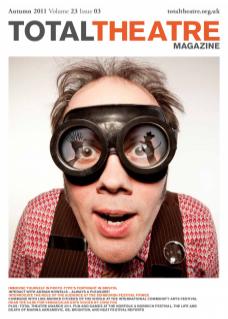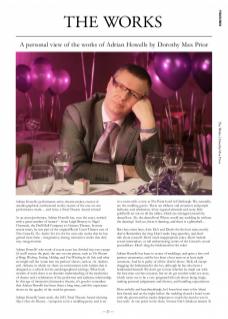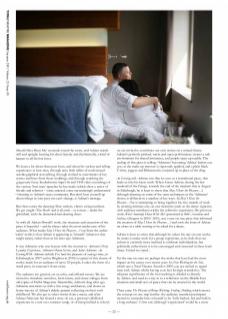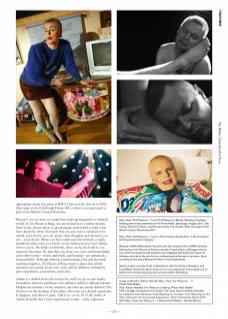Adrian Howells: performance artist, theatre-maker, creator of autobiographical-confessional works, master of the one-on-one performance mode… and twice a Total Theatre Award winner!
As an actor/performer, Adrian Howells has, over the years, worked with a great number of ‘names’ – from Leigh Bowery to Nigel Charnock, the Drill Hall Company to Citizens Theatre. In more recent times, he was part of the original Royal Court Theatre cast of Tim Crouch’s The Author. Yet it is for his own solo works that he has gained most fame – imaginative, daring, interactive works that defy easy categorisation.
Adrian Howells’ solo work of recent years has divided into two camps (if you’ll excuse the pun): the one-on-one pieces, such as The Pleasure of Being: Washing, Feeding, Holding, and Foot Washing for the Sole; and what we might call the ‘come into my parlour’ shows, such as An Audience with Adrienne, in which we share an environment with Adrian that is designed as a vehicle for his autobiographical writings. What both strands of work share is an absolute understanding of the mechanics of theatre and a celebration of the performer and audience relationship. In this age of interactive/immersive theatre, it’s good to remember that Adrian Howells has been there a long time, and this experience shows in the quality of the work he presents.
Adrian Howells’ latest work, the 2011 Total Theatre Award-winning May I Have the Pleasure…? purports to be a wedding party, and is set in a room-with-a-view at The Point hotel in Edinburgh. We, naturally, are the wedding guests. There are ribbons and streamers and purple balloons; and celebratory silver sugared almonds and teeny little gold bells set out on all the tables, which are arranged around the dancefloor. Ah, the dancefloor! Where would any wedding be without the dancing? And yes, there is dancing, and there is a glitterball…
But that comes later, first: Do’s and Don’ts for the best man, mostly don’ts: Remember the ring. Don’t make long speeches, and don’t talk about yourself. Don’t crack inappropriate jokes. Don’t include sexual innuendoes, or tell embarrassing stories of the Groom’s sexual peccadilloes. Don’t shag the bridesmaid in the toilet.
Adrian Howells has been to scores of weddings, and quite a few civil partner ceremonies, and he has been a best man on at least eight occasions. And he is guilty of all the ‘don’ts’ above. Well, all except shagging the bridesmaid in the loo, although he has also been a bridesmaid himself. We don’t get to hear whether he made out with the best man on that occasion, but we do get another toilet sex story, which turns out to be a very poignant little tale about being single, making personal judgements and choices, and handling expectations.
Most awfully and heartbreakingly, he’s been best man to his (then) best friend, and on the night before the wedding shared a hotel room with the groom and lay awake desperate to touch the man he was in love with. At one point in the show, Yvonne Fair’s fabulous lament ‘It Should Have Been Me’ resounds round the room, and Adrian stands still and upright; beating his chest fiercely and rhythmically, a kind of lament to all his lost loves.
We learn a lot about these past loves, and about his various and telling experiences as best man, through tasty little titbits of confessional-autobiographical storytelling; through stylised re-enactments of key scenes and lines from those weddings; and through watching the gorgeously fuzzy Kodachrome Super-8s and VHS video recordings of the various ‘best man’ speeches he has made (which show a series of friends and relatives – some amused, some excruciatingly embarrassed – listening to Adrian’s saucy comments). But don’t beat yourself up about things in your past you can’t change, is Adrian’s message.
But then comes the dancing! Slow waltzes, cheery swing numbers. We get taught ‘The Slosh’ and it all ends – as it must – under the glitterball, with the demented dad-dancing disco.
As with all Adrian Howells’ work, the structure and execution of the piece is beautiful – and he always takes the most tender care of his audience. What marks May I Have the Pleasure…? out from the earlier ‘salon’ works is that Adrian is appearing as ‘himself’ (whatever that might mean), rather than as his alter-ego Adrienne.
It was Adrienne who was hostess with the mostest in Adrienne’s Dirty Laundry Experience, Adrienne’s Room Service, and Salon Adrienne. An Evening With Adrienne (which I’ve had the pleasure of seeing twice, in Edinburgh in 2007 and in Brighton in 2010) is typical of this cluster of works: made for an audience of up to 20 people, it takes the form of a small party in someone’s front room.
The audience are greeted, sat on sofas, and offered sweets. We are invited to introduce ourselves, form teams, and create collages from old copies of Hello! Magazine. Meanwhile, Adrian’s drag alter ego Adrienne entertains us with a few songs and dances, and shows us home-movies of Adrian’s elderly parents reflecting on their son’s childhood. We also get to select stories from a menu, and after Adrian/Adrienne has shared a story of, say, a personal childhood experience in a tent on a summer-camp, or of being bullied at school, we are invited to contribute our own stories on a related theme. Adrian’s perfectly pitched, warm and open performance creates a safe environment for shared intimacies, and people open up readily. The ending of this piece is telling: ‘Adrienne’ becoming ‘Adrian’ before our eyes as the make-up remover is rigorously applied, and a plain black T-shirt, joggers and Birkenstocks conjured up in place of the drag.
An Evening with Adrienne can thus be seen as a transitional piece, that leads us into his latest work. When I meet Adrian, during the last weekend of the Fringe, towards the end of the mayhem that is August in Edinburgh, he is keen to stress that May I Have the Pleasure…?, although drawing on some of the same techniques as the ‘Adrienne’ shows, is different in a number of key ways. In May I Have the Pleasure…? he is attempting to bring together his two strands of work by creating intimate one-on-one moments (such as the dance vignettes with audience members) within the collective experience. His previous work, Won’t Somebody Dance With Me? (presented at BAC, London and Arches, Glasgow in 2010/ 2011), was a one-on-one piece that informed the creation of May I Have the Pleasure…? and took the form of Adrian sat alone at a table waiting to be asked for a dance.
Adrian is keen to stress that although he values his one-on-one works, he wants to make work for a group experience, as he feels that our culture is currently more inclined to celebrate individualism, but politically collectivism is to be encouraged and treasured in these hard times. United we stand…
Yet the one-on-ones are perhaps the works that have had the most impact on his career over recent years. In Foot Washing for the Sole, which one a Total Theatre Award in 2009, you are invited to spend time with Adrian whilst having your feet lovingly attended to. The religious significance of the foot-washing is alluded to directly by Adrian, and used as a way in to a reflection on the Middle East situation and small acts of peace that can be enacted in the world.
Then came The Pleasure of Being: Washing, Feeding, Holding, which moves the concept on one step further: the audience member/participant invited to surrender him or herself to be ‘fully bathed, fed and held in a long embrace’. I first saw (although ‘experienced’ would be a more appropriate word) this piece at BAC’s One-on-One festival in 2010, then again at the Edinburgh Fringe 2011, where it was presented as part of the British Council Showcase.
‘Pleasure’, we can note, is a word that crops up frequently in Adrian’s world. In The Pleasure of Being, you are invited in to a rather swanky hotel room, shown where to get changed, and invited to read a few lines about the show. You learn that you can wear a swimsuit or be naked, your choice; you can speak, share thoughts and memories, or not – your choice. When you have undressed and donned a crisply laundered white robe, you knock on the bathroom door and Adrian invites you in. He helps you disrobe, takes you by the hand as you step into the water. He asks that you close your eyes, and immediately your other senses – touch, and smell, and hearing – are enhanced a thousandfold. Although without a fixed narrative beyond the ritual washing sequence, The Pleasure of Being creates a space into which narrative can unfold. Everyone’s story will be different, defined by past experiences, associations, memories.
Adrian is a skilled artist who knows his stuff: we are in safe hands, boundaries between performer and audience held in a delicate balance. Despite the intimacy of the situation, our roles are clearly defined. The theatre is in the framing of this place, this time, as a shared experience. It happens, and then it’s gone. And it is – as are all of the works of Adrian Howells that I have experienced to-date – truly a pleasure.
May I Have The Pleasure…? and The Pleasure of Being: Washing, Feeding, Holding were both presented at The Point Hotel, Edinburgh, August 2011; the first by Traverse Theatre, and the second by The Arches. Both were part of the British Council Showcase 2011.
May I Have The Pleasure…? won a Total Theatre Award 2011 in the Innovation and Experimentation category.
Between 2006-2009 Adrian Howells was the recipient of an AHRC Creative Fellowship in the School of Culture and the Creative Arts at Glasgow University, where his practice-led research was engaged with looking at issues of intimacy and risk in the one-to-one confessional performance practice. He is currently an Honorary Research Fellow in the Department.
Adrian is also currently Artist-in-Residence with the Arches, Glasgow, and TouchBase, Sense Scotand, where he runs a progressive arts programme for adults with complex learning and communication difficulties..



